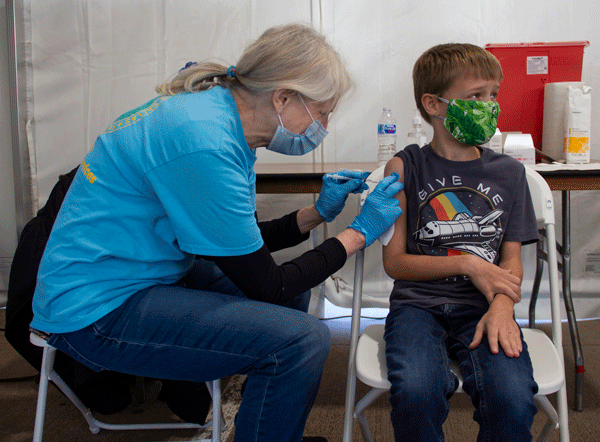COVID-19 booster shots, vaccines for children available at Eastfield

A boy gets his first dose of the Pfizer vaccine at the Eastfield site on Nov. 5.
November 9, 2021
Nancy Abdo, senior manager of Eastfield’s Health Center, said she’s excited Eastfield is offering COVID-19 booster vaccinations, and she feels the vaccine is the “best way to keep people safe.”
“I’m not a gambler,” Abdo said. “I am not going to take a chance. I am always going to go for what’s going to protect me the most.”
Dallas College offers COVID-19 vaccinations and boosters twice a week at every campus. At Eastfield, students and employees are eligible for a free COVID vaccination every Wednesday and Thursday morning in C-135 from 8:30 to 11:30.
All three vaccination options plus boosters are also available via drive-thru off the La Prada Drive entrance Tuesday through Saturday, from 9 a.m. to 6 p.m. Entrance gates close at 5:30 p.m.
The drive-thru location began administering Pfizer vaccinations to children ages 5 through 11 on Nov. 4.
“I just want students to know we’re here and that we’re at their service,” Abdo said. “It’s included with their tuition, so I want them to know they have this as a resource. … We’re not going to charge them for anything that we do.”
As of Oct. 21, the Centers for Disease Control and Prevention endorsed options for booster shots for all three COVID-19 vaccination options available in the United States.
Any person over the age of 65 is qualified for a booster as well as anyone 18 or older who works or lives in a high-risk environment, has underlying medical conditions or lives in a long-term care setting.
For those who received Pfizer-BioNtech or Moderna vaccinations, a six-month waiting period is recommended between the booster and their second dose. For the nearly 15 million people who received the Johnson & Johnson vaccine, a booster is recommended after two months, according to the CDC.
Individuals may now choose which vaccine they receive as a booster dose, allowing for a mix and match approach. However, many healthcare providers recommend sticking with the vaccine type the patient originally received in most instances.
The booster dose is not the same as the recommended third dose for persons with a compromised immune system. Immunocompromised individuals are eligible for three full doses when it comes to either Pfizer or Moderna. They would not be eligible for an additional booster after their third dose as of now.
The dosing amounts are the same for Pfizer (0.3mls) and Johnson and Johnson (0.5mls), regardless of if it’s a booster dose or not. For Moderna, the initial doses are 0.5mls and any subsequent booster dose would be cut in half to 0.25mls.
Nina Lambert, English instructor, voiced a strong concern for her elderly parents and a desire to do everything she can to help return to a state of pre-COVID normality.
“My father is in his 80s and my mom is in her 70s and is currently undergoing treatment that lowers her immunity,” Lambert said. “It’s important for me not to endanger her. … It’s my top concern. I don’t want even a 5% chance of any danger coming from me.”
Lambert said she plans to get her booster dose as soon as she’s eligible, and she hopes everyone will closely monitor the facts from healthcare professionals.
“It shouldn’t have been a political issue on either left or right to begin with,” Lambert said. “Public health should be a priority on both sides.”
Daniel Grigerek, business administration major, said he has concerns about the long-term effects of the vaccine, even after already receiving two doses of the Pfizer vaccination. However, he said he believes in trusting the advice of medical professionals.
“I’m a little skeptical just because of how quickly [the vaccines] are being pumped out,” Grigerek said. “But at the end of the day, I’m going to trust it. I’m going to get it.”
Grigerek said he used to believe the vaccination was just a matter of personal preference, but after realizing his immunocompromised partner is still at risk from unvaccinated persons, he’s changed his mind.
“I realized anemic people, like my girlfriend, even though she’s vaccinated, she could still catch COVID from an unvaccinated person,” Grigerek said. “I thought [unvaccinated people] were only putting themselves at risk. I came to find out that’s not entirely true.


